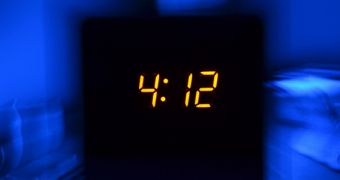Investigators with the Norwegian University of Science and Technology (NUST) in Trondheim, led by researcher Lars Laugsand, MD, PhD, determined in a new study that people suffering from insomnia may potentially be at an increased risk of suffering a heart attack later on. The exact nature of this connection remains somewhat mysterious though, the team reports.
Statistically, up to 73 percent of all people who have suffered a heart attack display symptoms usually associated with insomnia, such as waking up constantly, sleeping poorly, and struggling to fall asleep once they go to bed. Whether or not the correlation between the two is causal has yet to be determined, and it will probably require more studies.
Details of the research appear in a paper published in the latest issue of the European Heart Journal, PsychCentral reports. Researchers say that heart attack is the generic term used for instances when the heart is no longer able to pump blood through the body at the correct pressure levels, most often due to a weak or stiff heart muscle.
The Norwegian investigators looked at the cases of 54,279 test subjects, aged 20 to 89. Participants in this survey were tracked for 11 years, and 1,412 of them went on to get diagnosed with heart failure in this interval. None of the people in the research had heart issues when the study began.
In the new paper, the team explains that insomnia “is considered to be a disorder of chronic activation of stress responses, with sympathetic arousal and activation of the hypothalamic pituitary adrenal axis which is accompanied by increased heart rate, elevated blood pressure, and elevated levels of pro-inflammatory cytokines and circulating catecholamines.”
When the study began, all participants were asked about the sleep- or insomnia-symptoms they may have been experiencing at the time. Researchers found that people who reported three or more such symptoms when the study began were three times more likely to suffer a heart attack within 11 years.
The correlation held even after the NUST team controlled for other factors that may have been influencing the research, including shift work, education level, gender, blood pressure, age, BMI, smoking, anxiety, depression, cholesterol levels, and the presence or absence of diabetes.
“There was a dose-dependent association between the number of insomnia symptoms and risk of heart failure. This finding may be interpreted as suggesting that compromising some aspects of sleep may be somehow compensated for, and the net effect on cardiovascular disease may be limited,” the team adds.
“For example, having difficulty falling asleep might be compensated for by a satisfactory depth and a good continuity of sleep. However, if the initiation of sleep is poor and combined with repeated awakenings and superficial sleep, there may not be any compensatory mechanisms,” the scientists conclude.

 14 DAY TRIAL //
14 DAY TRIAL //